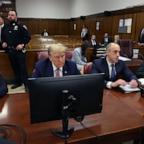Three Win Nobels for Work in Plastics
S T O C K H O L M, Sweden, Oct. 10 -- Two Americans and a Japanese researcherwon the Nobel Prize in chemistry today for their discoveries thatplastic can conduct electricity, allowing it to be used to reducestatic electricity and interference on photographic film andcomputer screens.
Alan J. Heeger, 64, of the University of California at SantaBarbara; Alan G. MacDiarmid, 73, of the University of Pennsylvania;and Hideki Shirakawa 64, of the University of Tsukuba in Japan werecited for their revolutionary discovery that plastics can, withmodifications, be made to conduct electricity as well as insulate.
“When it comes to light-emitting imaging diodes, there are nocorresponding usages at all for metals. This [research] will openup entirely new areas that we’ve only seen the beginning of,” saidPer Ahlberg, a member of the Royal Swedish Academy of Sciences.
Work in Flat TV Screens, Traffic Lights
The prize is worth 9 million kronor (US$915,000) this year.
The three researchers found “that a thin film of polyacetylenecould be oxidized with iodine vapor, increasing its electricalconductivity a billion times,” the citation said.
The joint work of the three researchers in Philadelphia led tothe development of light-emitting diodes in plastics. The so-called“brilliant plastics” could eventually lead to the development offlat television screens and luminous traffic and information signsthat don’t need bulbs, the academy said.
The conductive polymers have already been used to reduce staticelectricity and interference on photographic film and computerscreens.
“One reason for the great commercial potential of conductiveand semiconductive polymers is that they can be produced quicklyand cheaply,” according to the citation.
The physics prize was awarded earlier today to Zhores I.Alferov of the A.F. Ioffe Physico-Technical Institute in St.Petersburg, Russia, Herbert Kroemer, a German-born researcher atthe University of California at Santa Barbara and Jack Kilby ofTexas Instruments in Dallas.




